
People around the globe are playing Gorodki
/ Главная / Russkiy Mir Foundation / Publications / People around the globe are playing GorodkiPeople around the globe are playing Gorodki
The traditional Russian game of Gorodki dates back to the 18th century. It was played by Leo Tolstoy and Maksim Gorky. In Soviet times, Gorodki turned into a legitimate sport, and this year marks the 85th anniversary of the first USSR championship. Today, the Gorodki is played not only in Russia and the CIS countries - Russian compatriots have brought the game to the far abroad. It has been found that the Gorodki can unite nations (Karelia and Finland hold joint tournaments) and bring back to the origins: it was abroad that many compatriots took up a bat for the first time.
Bat as sword
As it suits historical justice, today Russia is still the standard-bearer when it comes to the development of Gorodki in the world. Gorodki (literally little cities or townlets) is supported, to one extent or another, by several ministries. Athletes compete for local, city, and all-Russian awards. Gorodki is also played at fairs, in schools and universities, at sports events held by companies for their employees, etc.
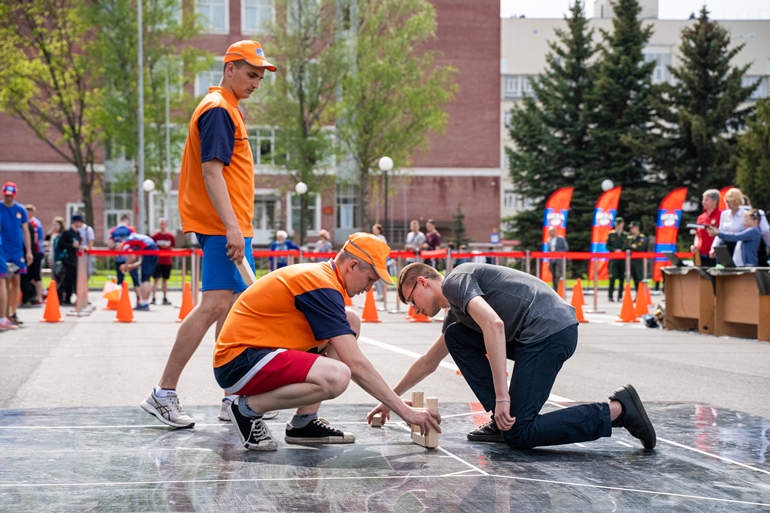
Briefing on arrangement of configuration. Photo credit: Russian Federation of Gorodki Sport
Today the Russian Federation of Gorodki Sport unites 32 regional federations in all federal districts of the country. In 2020, due to the coronavirus pandemic, major competitions were postponed, but with the first decline, the Gorodki players managed to hold the Russian championship in Yevpatoriya.
– In 2021, the Unified Schedule of Sports Events has reached the pre-COVID level, Nadezhda Pavlova, President of the Russian Federation of Gorodki Sport, told the Russkiy Mir. - Championships and competitions are held in all federal districts. There is the Russian championship to come. It will be hosted by Kaluga for the first time. In July, Kaluga will hand on the sports baton to Cherepovets, which traditionally represents another sports discipline - the Finnish Gorodki.
Also, the world championship in towns will be held this year. This competition will be hosted by Priozersk, where a modern Gorodki complex has been built. There you can play all year round. Teams from nearly two dozen countries will play for the championship.
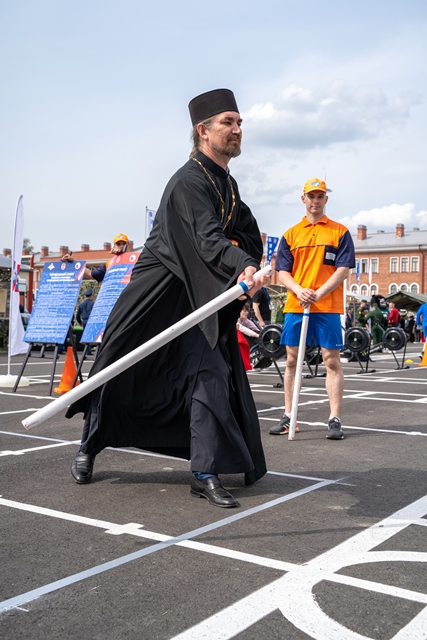
Everybody plays Gorodki in Russia. Photo credit: Russian Federation of Gorodki Sport
– Speaking of the young people’s interest in our sport, motivation is important here, the head of the Federation says. - The Russian Federation of Gorodki Sport offers an excellent incentive: the Ministry of Sports of Russia has approved a new Unified Sports Classification that enables the younger generation now to get athletic titles and qualifications not only at events indicated in the Unified Schedule but also at other sports and athletic events.
Furthermore, young Gorodki athletes will know that they have been the pioneers of the Russian national sport. It is an interesting historical fact that Russian two-handed combat swords glorified in bylinas and epics, actually weighed four kilograms. This is the weight of the Gorodki bats of masters of the shoulder strike.
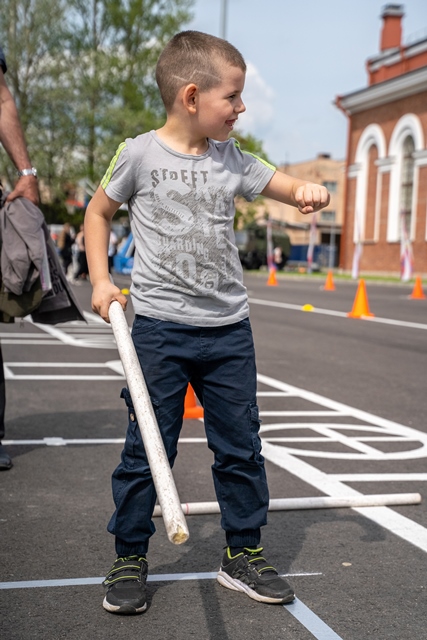
Gorodki is the sport of the future. Photo credit: Russian Federation of Gorodki Sport
Gorodki for compatriots
If you want to understand the scale of the modern Gorodki movement, just look at the website of the International Federation of Gorodki Sport founded nearly 30 years ago. Its members include associations from 12 countries of the world, including Russia, the Baltic countries, the CIS, Germany, Finland, and Mongolia.
The Federation is headed by Al-Khatib Mamdouh from Syria who is a graduate of the Russian Economic Academy. In one of his interviews he said that he saw the prospects for promoting Gorodki on a global scale in the involvement of immigrants from Soviet republics living around the world. Russian-speaking communities are happy to play Gorodki (all they need are playgrounds and equipment), and the local population will be involved.
This is exactly what happened in Germany. Today this country is considered one of the most advanced in Gorodki sports. The development of Gorodki in it is closely associated with the name of Edwin Feser. Thirty years ago, a native of Chelyabinsk who was the director of a vocational school, went to the old country. While working on an adaptation program for the Russian-speaking population of Germany, Feser included Gorodki sessions in it, although he had not played it in Russia.
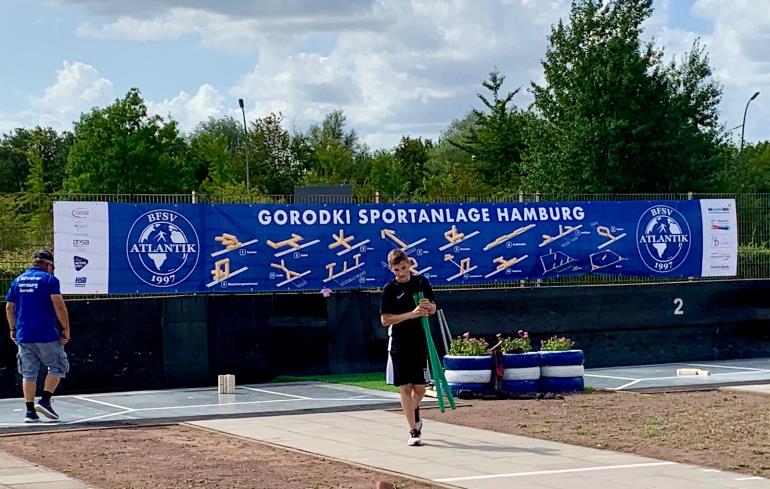
Photocredit: Vitaly Rommel
Eventually, Gorodki is played in more than fifty cities and half of the country's states; and local authorities allocate funds for equipping grounds and organizing German Gorodki championships. In Karlsruhe, a modern Gorodki stadium has been built, which can lay claim to being the largest in the world. Last year, Edwin Feser passed away, but the Gorodki evolution has not been interrupted.
Gorodki came to the small town of Oberndorf am Neckar near Stuttgart through Edwin Freser and local activists. One of them, Sergei Rutkovsky, told the Russkiy Mir how it had happened.
– My father and I attended a tournament in Karlsruhe and also tried playing. We liked it. Edwin Feser invited us to develop Gorodki at home. Together with him, we went to the governor of our settlement. We had to explain what kind of sport it was and showed pictures. We were given a site and we made four playgrounds in 2016. Two years ago we hosted the German Cup; we had visitors from all over the country. I was the second at our playgrounds.
Today, there are 17 athletes in Oberndorf an der Neckar who actively play Gotodki. Most of them are Russian-speaking.
- Now our region has the most coronavirus cases in the country, so there is no training yet, says Sergey. - We usually train twice a week. We do our best to involve locals. Many passers-by are interested; we offer them to throw the bat. The Germans have no game like this; everyone here is interested in football. "
Russian game
Hamburg is one of the German capitals of Gorodki. The bat has been thrown on a target for over twenty years here, and local players are considered to be among the strongest in the country and in the world. Vitaly Rommel, the head of the Hamburg sports club, which is engaged in the development of Gorodki, told the Russkiy Mir that the club had become a member of the state program for the integration of Russian-speaking residents of Germany through sports.
- First, we used to throw the bat on the rubber and didn't really know the rules, but then we became involved, got acquainted with other Gorodki players in Germany, and started participating in tournaments, he says. - We have already gone twice to play in Moscow and built the playground on four fields.
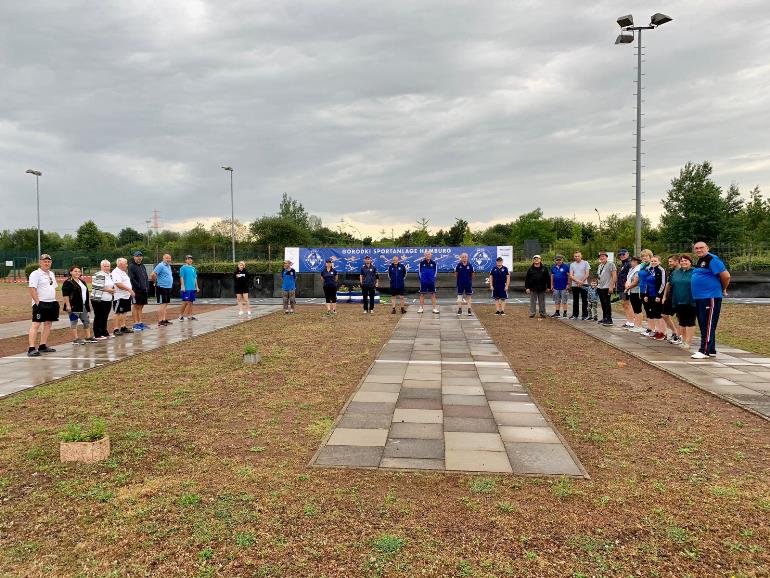
Photo credit: Vitaly Rommel
15 people train regularly, and just as many people come to trainings and games from time to time.
- Those that play Gorodki as sports and participate in tournaments are mostly of Russian-speaking community, says Vitaly. - The Germans come to some clubs to throw bats for fun. And sometimes not only Germans come to us - Hamburg is a multinational city. How do they know about us? Local television has made reports about us several times.
Almost all members of the club took bats for the first time in Germany, and only a few people remembered playing as a child. For many, Gorodki has been an opportunity to become part of the Russian-speaking community and make new friends.
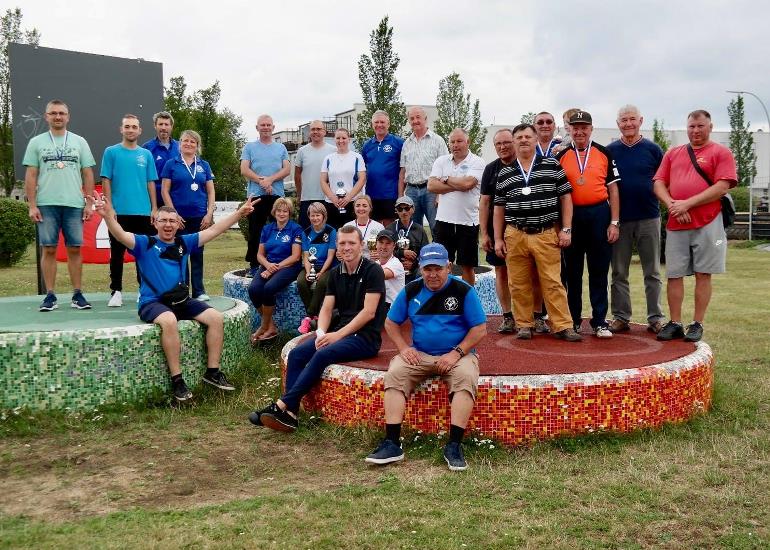
Photo credit: Vitaly Rommel
In Hamburg, Gorodki is an all-season game. In winter, training is shifted indoors. Outdoor playgrounds for Gorodki were built as the part of the sports complex, so basketball and tennis players from the neighboring courts gaze at the exciting game.
- We approach those that stand and look for more than a minute, talk about the towns, and suggest quitting, says Vitaly. - Some people don't even understand that this is a sport - men of a respectable age throw sticks.
By the way, they don’t conceal the fact that the game is of Russian origin but even emphasize it at official competitions in Germany. Both protocols and banners feature the inscription - Gorodki.
There is a good chance that Gorodki has fallen into decline in Estonia, which used to be one of the centers of Gorodki sport in Soviet times, just because of its Russian origin. Mikhail Yefremov, the patriarch of Estonian Gorodki, said bitterly that only one decent playground remained in the country. And the Estonian authorities have ignored the request of local players to purchase a mobile playground to popularize the Gorodki.
Kyykkä – Gorodki finnish style
After the collapse of the Soviet Union, when the Gorodki movement had almost disappeared, and more fancy sports took over the grounds, Karelia was one of the first regions in Russia that aimed to revive Gorodki. This process was going in parallel with the development of traditions and folklore since they managed to find kyykk?, a Finnish-Karelian analog of Gorodki played since ancient times

Photo credit: Rudolf Koivisto
It took several years to find players, establish sports ties with the Finns and arrange joint international tournaments. However, it soon became clear that this folk game was pretty much forgotten in Finland.
- When we were training, even elderly people were surprised saying, “oh, this is kyykk?, this is how it looks,” Rudolf Koivisto, a native of Kondopoga and now a resident of Helsinki, told the Russkiy Mir.
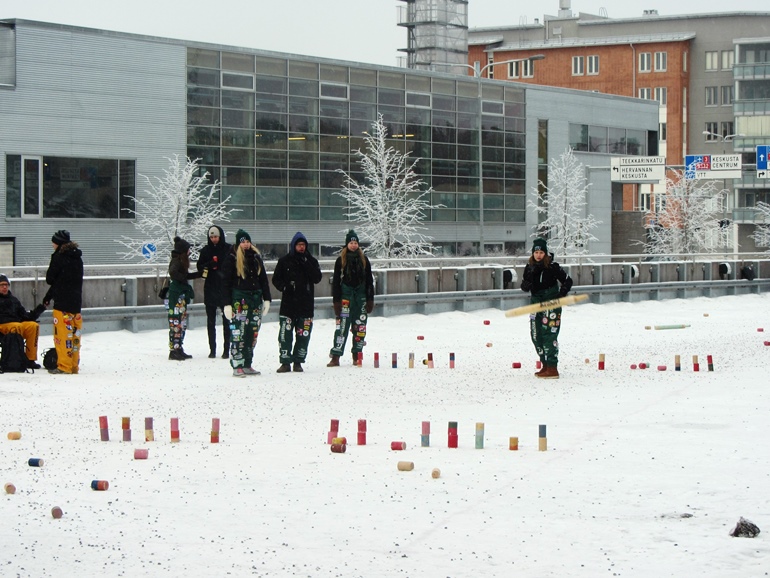
Photo credit: Rudolf Koivisto
Once in Finland, Rudolf joined the Finland-Russia Friendship Society, and during one of the twin-city trips to Karelia the delegation members were offered to play Gorodki.
- We tried to play together with the Finns, took part in a master class, and many liked it, he says. – Having returned to the town of J?ms?, where I lived back then, we were puzzled where to find the equipment. In Karelia, it was believed that all Finns knew this game, and almost everyone had a kit for kyykk?. But finding the skittles was not easy. At first, we got the used equipment of one of the players, the champion of Finland, who had already died by that time.
Other sets were ordered from the workshops, and the playground was arranged at one of the school stadiums. And the game began.
- There is a kyukk? competition in Finland, quite serious one, strong teams play for championship, says Rudolf Koivisto. - Finnish-speaking athletes play there; they even won the world championship. Student tournaments are held as well. Maybe the game will become the folk one again. It is a good game, it unites. There is always a friendly atmosphere; I don’t remember anyone having hard feelings.
New publications

 Mikhail Kalatozov, a director who transformed the world of cinematography in many ways, was born 120 years ago. He was a Soviet film official and a propagandist. Above all, he was capable of producing movies that struck viewers with their power and poetic language.
Mikhail Kalatozov, a director who transformed the world of cinematography in many ways, was born 120 years ago. He was a Soviet film official and a propagandist. Above all, he was capable of producing movies that struck viewers with their power and poetic language.  Ukrainian authorities have launched a persecution campaign against the canonical Ukrainian Orthodox Church (UOC), the biggest one in the country's modern history. Over the past year, state sanctions were imposed on clergy representatives, searches were conducted in churches, clergymen were arrested, criminal cases were initiated, the activity of the UOC was banned in various regions of the country, and monasteries and churches were seized.
Ukrainian authorities have launched a persecution campaign against the canonical Ukrainian Orthodox Church (UOC), the biggest one in the country's modern history. Over the past year, state sanctions were imposed on clergy representatives, searches were conducted in churches, clergymen were arrested, criminal cases were initiated, the activity of the UOC was banned in various regions of the country, and monasteries and churches were seized.  When Nektary Kotlyaroff, a fourth-generation Russian Australian and founder of the Russian Orthodox Choir in Sydney, first visited Russia, the first person he spoke to was a cab driver at the airport. Having heard that Nektariy's ancestors left Russia more than 100 years ago, the driver was astonished, "How come you haven't forgotten the Russian language?" Nektary Kotlyaroff repeated his answer in an interview with the Russkiy Mir. His affinity to the Orthodox Church (many of his ancestors and relatives were priests) and the traditions of a large Russian family brought from Russia helped him to preserve the Russian language.
When Nektary Kotlyaroff, a fourth-generation Russian Australian and founder of the Russian Orthodox Choir in Sydney, first visited Russia, the first person he spoke to was a cab driver at the airport. Having heard that Nektariy's ancestors left Russia more than 100 years ago, the driver was astonished, "How come you haven't forgotten the Russian language?" Nektary Kotlyaroff repeated his answer in an interview with the Russkiy Mir. His affinity to the Orthodox Church (many of his ancestors and relatives were priests) and the traditions of a large Russian family brought from Russia helped him to preserve the Russian language.

 The leaders of the Friends of the Great Russia cultural association (Amici Della Grande Russia) in Italy believe that the Western policy of abolishing Russian culture in Europe has finally failed. Furthermore, it was doomed to failure from the beginning.
The leaders of the Friends of the Great Russia cultural association (Amici Della Grande Russia) in Italy believe that the Western policy of abolishing Russian culture in Europe has finally failed. Furthermore, it was doomed to failure from the beginning.  Name of Vladimir Nemirovich-Danchenko is inscribed in the history of Russian theater along with Konstantin Stanislavski, the other founding father of the Moscow Art Theater. Nevertheless, Mr. Nemirovich-Danchenko was a renowned writer, playwright, and theater teacher even before their famous meeting in the Slavic Bazaar restaurant. Furthermore, it was Mr. Nemirovich-Danchenko who came up with the idea of establishing a new "people's" theater believing that the theater could become a "department of public education."
Name of Vladimir Nemirovich-Danchenko is inscribed in the history of Russian theater along with Konstantin Stanislavski, the other founding father of the Moscow Art Theater. Nevertheless, Mr. Nemirovich-Danchenko was a renowned writer, playwright, and theater teacher even before their famous meeting in the Slavic Bazaar restaurant. Furthermore, it was Mr. Nemirovich-Danchenko who came up with the idea of establishing a new "people's" theater believing that the theater could become a "department of public education."  "Russia is a thing of which the intellect cannot conceive..." by Fyodor Tyutchev are famous among Russians at least. December marks the 220th anniversary of the poet's birth. Yet, he never considered poetry to be his life's mission and was preoccupied with matters of a global scale. Mr.Tyutchev fought his war focusing on relations between Russia and the West, the origins of mutual misunderstanding, and the origins of Russophobia. When you read his works today, it feels as though he saw things coming in a crystal ball...
"Russia is a thing of which the intellect cannot conceive..." by Fyodor Tyutchev are famous among Russians at least. December marks the 220th anniversary of the poet's birth. Yet, he never considered poetry to be his life's mission and was preoccupied with matters of a global scale. Mr.Tyutchev fought his war focusing on relations between Russia and the West, the origins of mutual misunderstanding, and the origins of Russophobia. When you read his works today, it feels as though he saw things coming in a crystal ball...